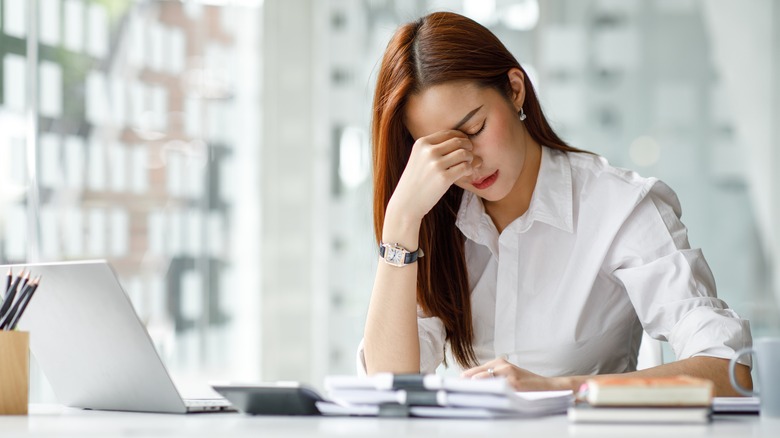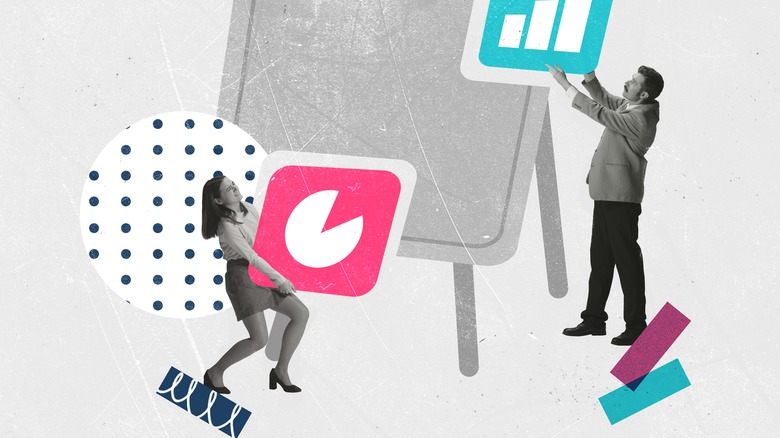Could Paid Menstrual Leave Be The Work Perk Of The Future?
Periods often come with uncomfortable and inconvenient symptoms. Some of the lovely side effects of a period include stomach cramps, back pain, mood swings, fatigue, and soreness. Siobán Harlow, a professor of epidemiology and global public health at the University of Michigan's School of Public Health, disclosed to The Washington Post that 15 to 25% of people who receive periods have moderate to severe cramps while menstruating, while between 10 and 15% of people who menstruate will experience symptoms that cannot be managed by anti-inflammatory medications like Aleve or Advil.
As registered nutritionist and author of the book "You Can Have a Better Period" Le'Nise Brothers told Glamour UK, "We have a greater need for rest during our periods, especially on the first one or two days, when our estrogen levels — our feminizing, energizing hormone — are at their lowest." Despite this biological need for rest, however, most companies in the US expect their employees to attend work and hustle straight through their menstruation period.
But this might not be the case for long. In February 2023, Spain became the first European country to pass a law mandating three days of monthly paid menstrual leave for workers, AP News reports. Meanwhile, countries like Japan, China, Indonesia, and Zambia have had similar policies in place for quite some time.
The push for paid menstrual leave
While other western countries have yet to legislate menstrual leave as a worker's right, various independent companies already offer this benefit to their employees. Examples of American companies with paid menstrual leave include Nuvento and Chani.
Research shows that the employers that offer menstrual leave likely benefit from the policy themselves. BMJ published a study of over 32,000 women between the ages of 15 and 45 that investigated their productivity levels. The researchers found that women were less productive overall when they attended work with menstrual symptoms, compared to when they took off the days on which they experienced period-related pain. So, by providing menstrual leave, employers will likely see a boost in productivity.
In addition, a survey conducted by Resume Builder discovered that four out of five American employees support paid menstrual leave; notably, the policy is much more popular with workers 16 to 35 years old. With that in mind, menstrual leave could be a useful incentive for recruiting and retaining younger talent.
The complications of paid menstrual leave
For anyone with a uterus, being able to take care of yourself while on your period likely sounds ideal. For many, it may feel like the bare minimum. However, legislating paid menstrual leave is a complicated issue with numerous potential impacts. As professor of gender and employment relations at the University of Sydney Marian Baird tells The Washington Post, "Opponents are worried menstrual leave will reinforce negative gender stereotypes and notions of biological determinism, leading to more employer discrimination against women."
In an article published by The Palgrave Handbook of Critical Menstruation Studies, researchers caution that this legislation could result in benevolent sexism. The paper cites Japan and Zambia's menstrual legislation as examples, explaining that these laws were originally enacted to encourage women to prioritize motherhood. The researchers write that "menstrual leave may also perpetuate the belief that menstruation is something about which to be ashamed and to be kept private, and therefore avoided in the workplace." Clearly, many people have differing opinions on the issue, and only time will tell whether the U.S. and other western countries follow Spain's suit.


